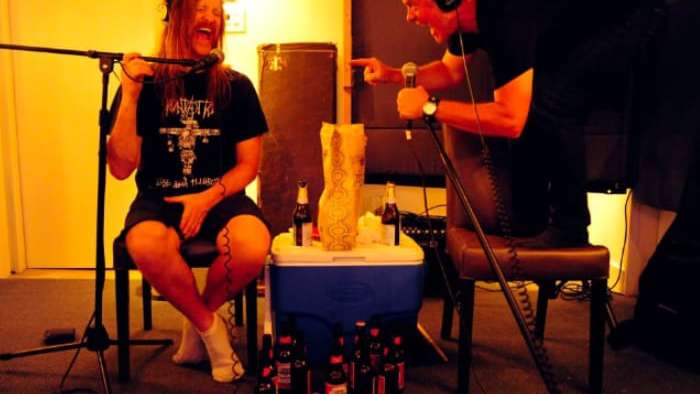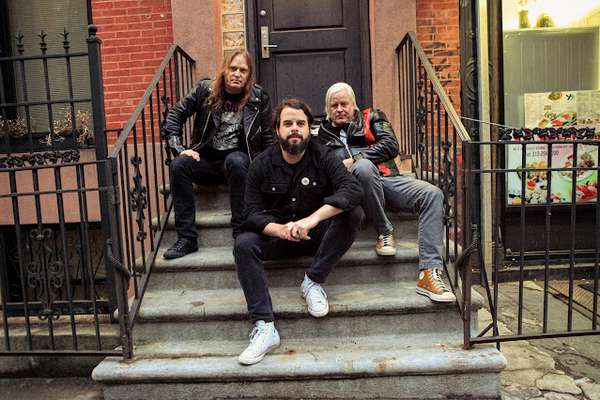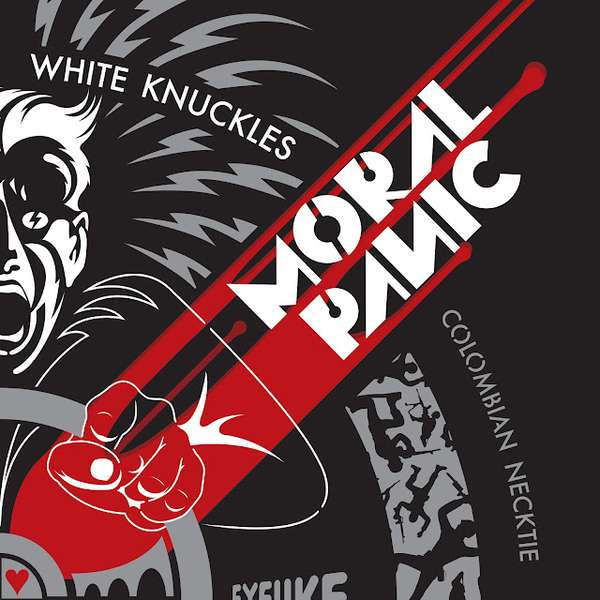Most musicians have day jobs – and not just to pay the bills. Jobs provide new challenges, personal fulfillment and, yes, some rent or gas money. And usually when somebody is writing a new record or scheduling a tour, they have to balance that with their job.
How an artist spends their time by day will influence the creative process at night. In Don’t Quit Your Day Job, Scene Point Blank looks at how musicians split their time, and how their careers influence their music or – sometimes – how their music provides escape.
In this edition, we chat with Moral Panic’s rhythm section, drummer Eric Robel and bassist Michael Dimmitt. The two are both filmmakers, who have impressive individual portfolios and also collaborated on Amphetamine Reptile documentary The Color of Noise.
Scene Point Blank: To start, can you share a bit about your job title(s) and background? You often work together, but not exclusively? What do each of you do, and how did you come together for The Color Of Noise?
Michael Dimmitt: The Color of Noise was Eric’s creation. We used to work together at a boutique production company, Working Pictures, for a guy name Bobby Sheehan. It was my first job as a video editor out of school. We worked on reality TV stuff there mostly, but I did get to cut my first feature narrative for Bobby.
Anyways, I met Eric when I first moved to NYC in 2003 because I had practically joined his band Nova Express, via Craigslist before I even moved to the city. When Bobby told us that he needed a graphics guy I told him I knew the guy for the job, because I knew Eric did motion graphics. It was the sort of production company where newbies could learn their craft. We both learned a lot from Bobby. Eric borrowed his camera gear for the first shoot of The Color of Noise which was with members of The Cows and Melvins in Omaha, Nebraska, and we learned as we went. I think Eric and I were a great team. He was the director and producer, director of photography, graphics guy. I was the camera operator, sound recordist, video editor, and co-producer. We are both Midwestern boys who live in the city which gave us the perfect combination of being driven yet at the same time able to relate to more working-class Midwestern types. We felt very comfortable traveling around the Midwest and West Coast doing interviews with everyone from Tom Hazelmyer to Shepard Fairy to Jello Biafra. To be honest, it was one of the most fun experiences I’ve ever had. It was as fun as being on tour. Instead of a show every night, in a different city, it was an interview and a hang with unique individuals, but I assure you just like when you are on tour, an obscene amount of beer was consumed.
Eric Robel: I was on tour with Heroine Sheiks and met Tom Hazelmyer. He was legendary for bringing his insiders in the back office to show off a bit and share merchandise. He impressed me completely. The amount of work output one person can achieve is baffling in his case. I thought, “Someone should make a documentary about this guy.”
Years later when the 25th Anniversary show was announced, no one had made that documentary yet, so I jumped on it. I flew a crew out to Minneapolis and we shot the whole thing though, before I left, I put together an outline and visual presentation to spring on Tom when I showed up. It was so chaotic that I never ran into him until Sunday AM after it was over. He was eating with Buzz (Melvins) at the bar and I walked up, formally introduced myself again and gave him the packet. He called me two weeks later and said, “Let’s do it”!
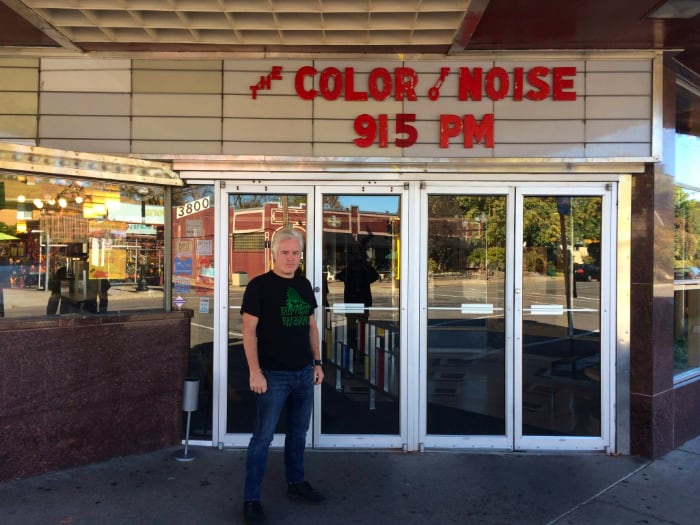
Scene Point Blank: If you can disclose it, what are you working on right now?
Michael Dimmitt: Well it has not been officially announced, but there is no reason to keep it a secret. Since the summer of 2018, I have been producing and directing my own feature documentary called A Wandering Path. It is about the record label Gilead Media, Adam Bartlett, the bands on his label, and Migration Fest that he Dave Adelson from 20 Buck Spin put on every two years. It is picture-locked, color-corrected, and getting it mixed as we speak. I am about to send it off to festivals and learn the whole process in the industry after your film is complete, which is all new to me. I am developing a couple of other things too.
Eric Robel: I am working on a music video for an upcoming record for an upcoming band.
Scene Point Blank: What was your job path that led you to your respective roles in film? How did you figure out that it was right for you?
Eric Robel: I landed a job at a post house in Manhattan. They bought a big, fat expensive machine that was Avid’s version of Flame, which is a digital effects compositor. I had just learned that program at NYU so the only reason they hired me is because they couldn’t find anyone to use it! I became an expert at film compositing and animation those few years there. Eventually that led to work with a film maker that Michael Dimmitt introduced me to. Then watching him make films, I figured out how to do that.
Scene Point Blank: In comparison to the previous question, when did you first become serious about being a musician? In other words, were you a musician or a filmmaker first?
Michael Dimmitt: I didn’t work on my first documentary until 2007 when I co-edited Until the Light Takes Us. I started playing guitar when I was 10 which was a longass time ago.
Eric Robel: Musician first. I started with drums in 1980 as a youngster. I dropped it for a while during college, then came back in my early 20s. My father was and still is a rock ‘n’ roll drummer.
Scene Point Blank: If all your film work is music related, I see a pretty obvious correlation. Did playing in bands directly push you toward this career path?
Michael Dimmitt: All my editing and camera work is not music related. Only the stuff that doesn’t pay well involves music, haha.
There must be some equation somewhere that spells it out, but it goes something like this: The more enjoyable and rewarding the project, the lower it pays. The more soul-crushing, tedious and unfulfilling the job is the more lucrative. So many people working in production are desperate for a passion project that they will do it practically for free. Then so many others seem not to care and just go for the stable cash.
As far as my career path, playing is bands has pretty much done nothing but make me sabotage my career over and over again. A tour gets booked and then a job opportunity is missed and that connection is lost. I have always picked musical endeavors and creative projects over lucrative career opportunities and in hindsight that was quite foolish of me, as I ultimately find myself being the only one in bands doing this, but I still have this naive idea that it is important to follow your passions over financial stability.
Eric Robel: It’s not [all music related], but the notable projects are. So yes, being in bands makes me want to do creative projects based around that current band.
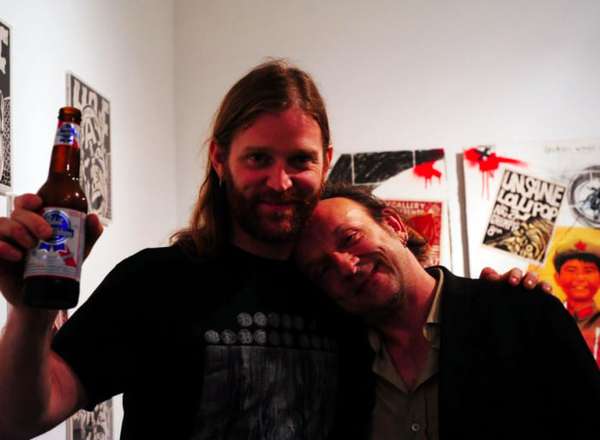
Scene Point Blank: Does your own music come up on the job?
Eric Robel: Only when I force it down their throats.
Michael Dimmitt: Well, my old band Mutilation Rites is featured in A Wandering Path, and I know Adam Bartlett because I am on his label, so there is that connection. I am not foolish enough to feature us extensively because there are other bands that are much more popular and still active, but it did come up in that situation.
Here is another example. I shoot and edit live concerts with Matt Rocker of Underground Media. He is the director and producer of all live concerts that Revolver Magazine does, and I assist him as camera operator and with the editing. It comes up in this realm, as I am often friends or at least acquaintances with a lot of the artists. It was pretty cool when we were shooting Soulfly at Gramercy. My bassist in Mutilation Rites, Ryan Jones was doing front of house, and I was in the photo pit shooting video of several of that bands that night. Ryan texted me in between bands to go down to the green room. Max Cavalera from Soulfly and Sepultura was down there and wanted to tell us how much of a fan he was of Mutilation Rites and would love to tour with us. Unfortunately the band was pretty much over at that point. That was a fun situation where music and the job intersected.
Scene Point Blank: You work with a few genres, though mostly noisier punk and black metal, based on the background I received -- this overlaps with your own musical style. Is that a personal choice or something you fell into?
Eric Robel: Both! At the same time!
Michael Dimmitt: I just play music that resonates with me. Since I am just a guitarist and sort of a bass player, I have to fall in line with other like-minded musicians instead of being able to be the leader of a band. After putting everything I had into a decade with Mutilation Rites, I am over trying to keep up with the trends of the metal scene. I am content to play some punk rock with my buddies in Moral Panic and rock ‘n’ roll with my other buddies in Overdose.
Scene Point Blank: Have you worked on any/many "outside" genre projects, like country or pop or something with a different culture? Or from your perspective, is it more "artists are artists" than something about a style or subculture? I may not be wording this one well…
Eric Robel: Worded perfectly.
Film-wise, yes. In the past I have been hired or asked to work on parts or videos or add things to them. I don’t have prejudice against music I don’t normally listen to or like. If I like someone, then I would like to work with them. Within reason, of course!
Scene Point Blank: This is a pretty creative job. How does that affect your own bands? Are you mentally drained at the end of the day, or do you schedule jobs or band practice a certain way to accommodate?
Eric Robel: No, I don’t struggle with scheduling or juggling too much work most of the time. It’s amazing how much one can do if there aren’t drugs or heavy drinking involved.
Check out previous entries in the Don’t Quit Your Day Job series.
